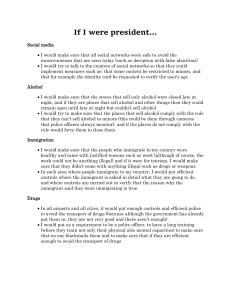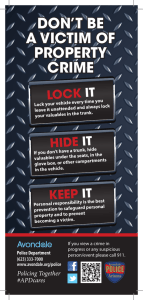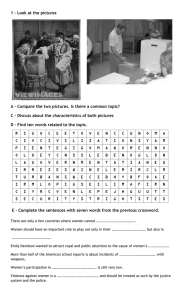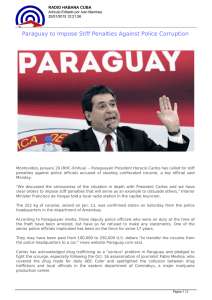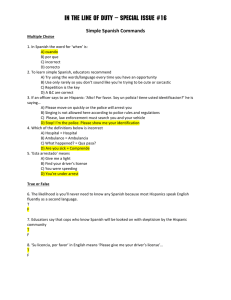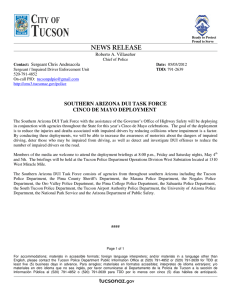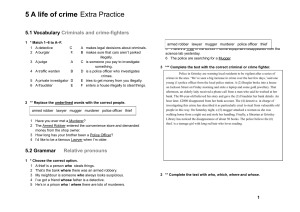when the police knock on your door your rights and options front black and white crimethinc
Anuncio
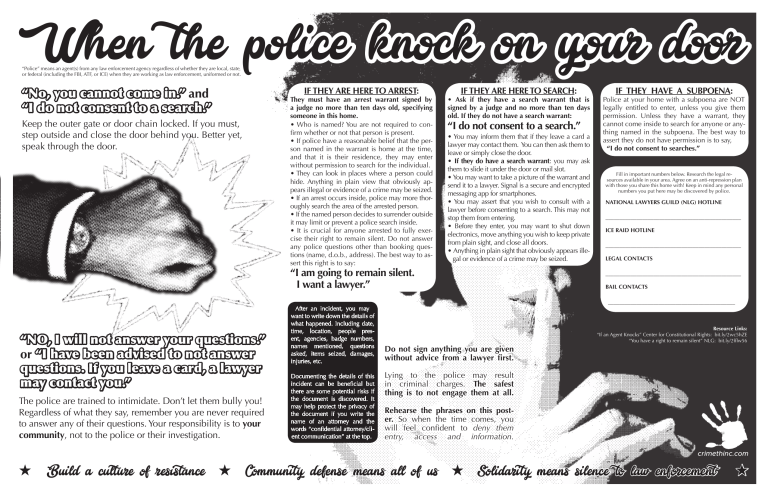
When the police knock on your door “Police” means an agent(s) from any law enforcement agency regardless of whether they are local, state, or federal (including the FBI, ATF, or ICE) when they are working as law enforcement, uniformed or not. “No, you cannot come in.” and “I do not consent to a search.” Keep the outer gate or door chain locked. If you must, step outside and close the door behind you. Better yet, speak through the door. IF THEY ARE HERE TO ARREST: They must have an arrest warrant signed by a judge no more than ten days old, specifying someone in this home. • Who is named? You are not required to confirm whether or not that person is present. • If police have a reasonable belief that the person named in the warrant is home at the time, and that it is their residence, they may enter without permission to search for the individual. • They can look in places where a person could hide. Anything in plain view that obviously appears illegal or evidence of a crime may be seized. • If an arrest occurs inside, police may more thoroughly search the area of the arrested person. • If the named person decides to surrender outside it may limit or prevent a police search inside. • It is crucial for anyone arrested to fully exercise their right to remain silent. Do not answer any police questions other than booking questions (name, d.o.b., address). The best way to assert this right is to say: IF THEY ARE HERE TO SEARCH: • Ask if they have a search warrant that is signed by a judge and no more than ten days old. If they do not have a search warrant: “I do not consent to a search.” • You may inform them that if they leave a card a lawyer may contact them. You can then ask them to leave or simply close the door. • If they do have a search warrant: you may ask them to slide it under the door or mail slot. • You may want to take a picture of the warrant and send it to a lawyer. Signal is a secure and encrypted messaging app for smartphones. • You may assert that you wish to consult with a lawyer before consenting to a search. This may not stop them from entering. • Before they enter, you may want to shut down electronics, move anything you wish to keep private from plain sight, and close all doors. • Anything in plain sight that obviously appears illegal or evidence of a crime may be seized. “I am going to remain silent. I want a lawyer.” “NO, I will not answer your questions.” or “I have been advised to not answer questions. If you leave a card, a lawyer may contact you.” The police are trained to intimidate. Don’t let them bully you! Regardless of what they say, remember you are never required to answer any of their questions. Your responsibility is to your community, not to the police or their investigation. After an incident, you may want to write down the details of what happened. Including date, time, location, people present, agencies, badge numbers, names mentioned, questions asked, items seized, damages, injuries, etc. Documenting the details of this incident can be beneficial but there are some potential risks if the document is discovered. It may help protect the privacy of the document if you write the name of an attorney and the words “confidential attorney/client communication” at the top. IF THEY HAVE A SUBPOENA: Police at your home with a subpoena are NOT legally entitled to enter, unless you give them permission. Unless they have a warrant, they cannot come inside to search for anyone or anything named in the subpoena. The best way to assert they do not have permission is to say, “I do not consent to searches.” Fill in important numbers below. Research the legal resources available in your area. Agree on an anti-repression plan with those you share this home with! Keep in mind any personal numbers you put here may be discovered by police. NATIONAL LAWYERS GUILD (NLG) HOTLINE ________________________________________________ ICE RAID HOTLINE ________________________________________________ LEGAL CONTACTS ________________________________________________ BAIL CONTACTS _____________________________________________ Resource Links: “If an Agent Knocks” Center for Constitutional Rights: bit.ly/2wc5hZE “You have a right to remain silent” NLG: bit.ly/2fflw56 Do not sign anything you are given without advice from a lawyer first. Lying to the police may result in criminal charges. The safest thing is to not engage them at all. Rehearse the phrases on this poster. So when the time comes, you will feel confident to deny them entry, access and information. crimethinc.com H Build a culture of resistance H Community defense means all of us H Solidarity means silence to law enforcement H
